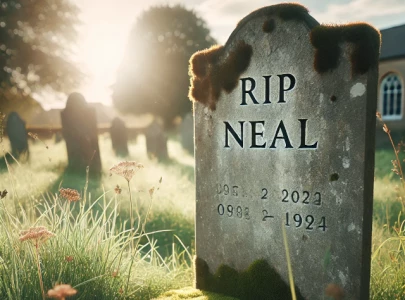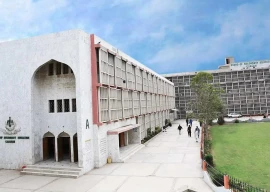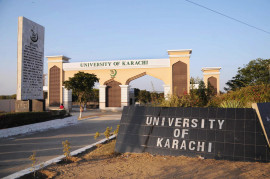
“Good morning, Sir,” echoed the classroom as soon as I walked in. This informal education centre, located in the katcha area on Mission Road in Sukkur was established in 2008 by the Diocese of Hyderabad and is jointly funded by the Church of Pakistan and a German NGO Kindernothilfe. Project manager Munawwar Gill said that they have established 15 centres in Sukkur district and their aim is to educate children living in the unplanned settlements. Currently, there are 1,054 children enrolled in their centres.
Gill clarified that these children are given informal education in English, Urdu, Islamiat and Math during their three years at the centre, after which they are able to join mainstream schools and obtain admissions in class VI.
When I entered the room, the children were in the middle of an English test. Their teacher, Shumaila, introduced me to her brightest pupil, eight-year-old Fahmeeda, who promptly went up to the blackboard and wrote her name. Later, she read out a story from her English book.
Fahmeeda’s 10-year-old friend, Kulsoom, was also keen to show off what she had learned. It was with great confidence that she answered all my questions in English. Eight-year-old Farah told me that she prefers this centre to the government school because, “I am getting special attention here and the teacher takes very good care of the students”.
Meanwhile, Tasveeran, who used to help her mother scrub utensils as a domestic worker, did not hesitate to join the centre when she learned that apart from a good education, the school would take care of her breakfast, lunch and even her uniform.
“Unlike other schools, we provide children breakfast and lunch at all the centres, besides giving them uniforms with shoes and stationery,” Gill said. The children are also given a medical check-up four days a week, he added. If any child is found suffering from a severe disease, he or she is hospitalised and the centre bears all the expenses, he said. Earlier, most of the children from Katcha Bunder were suffering from scabies and stomach ailments, so their medical teams started visiting the area every week.
Since the floods in 2010, most of the Katcha Bunder residents have been homeless and thus were given shelter, cooked food and medicines by the centre. According to Gill, every flood-affected family receives dry rations, including, wheat flour, rice, sugar, lentils, tea, salt and cooking oil, every month. He added, however, that they will stop supplying them after April, “because we don’t want them to become dependent on us”.
Kulsoom narrated her ordeal during the devastating floods last year. Her old school, set up in a hut, was washed away. “I kept studying at the relief camp, where my family had shifted to take shelter.”
For now, these children are happy and look up to their teacher. “I will become a teacher like Miss Shumaila and I will teach the children of my neighbourhood,” said Fahmeeda.
“She is so loving and caring and she never gets angry when we ask her questions repeatedly.”
Published in The Express Tribune, April 16th, 2011.

















COMMENTS
Comments are moderated and generally will be posted if they are on-topic and not abusive.
For more information, please see our Comments FAQ